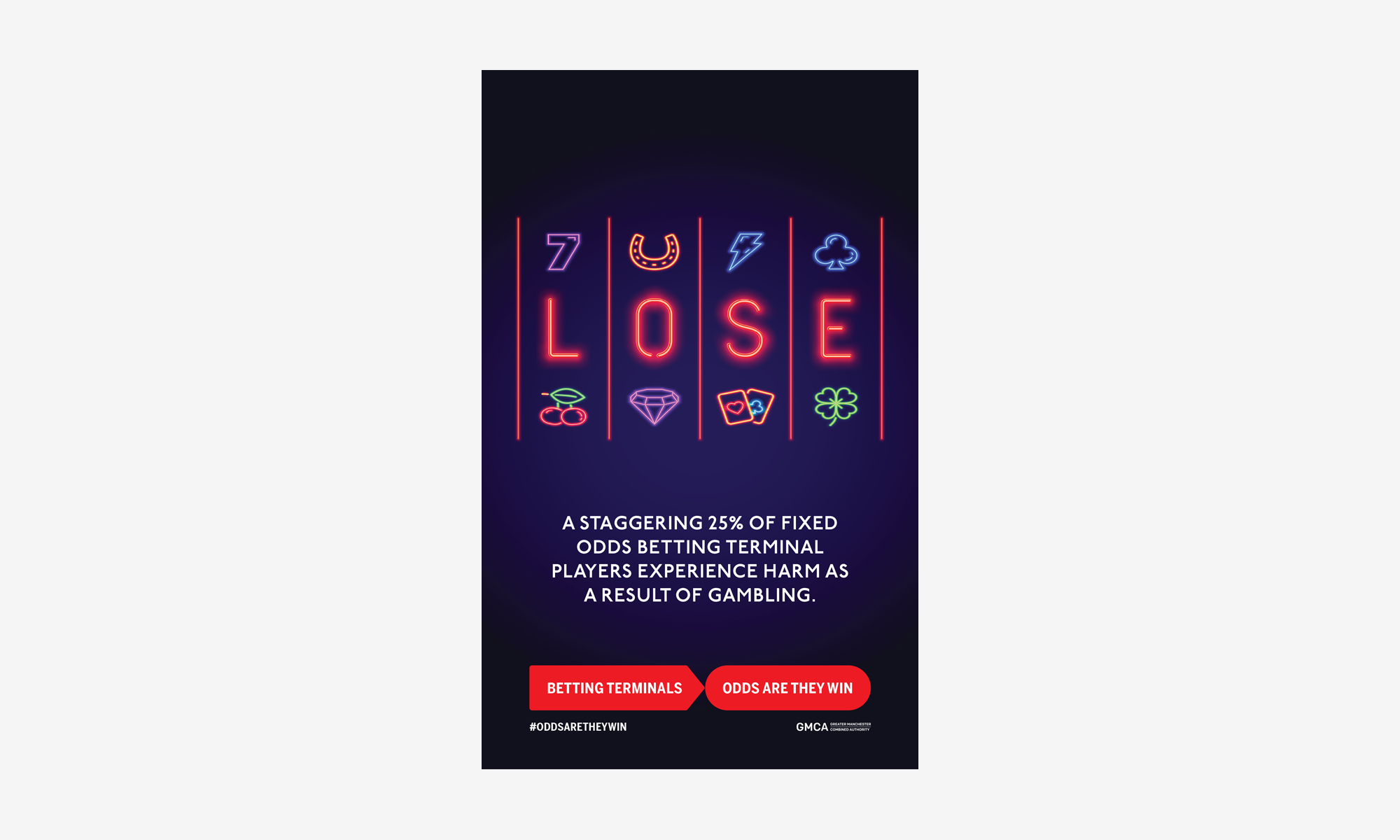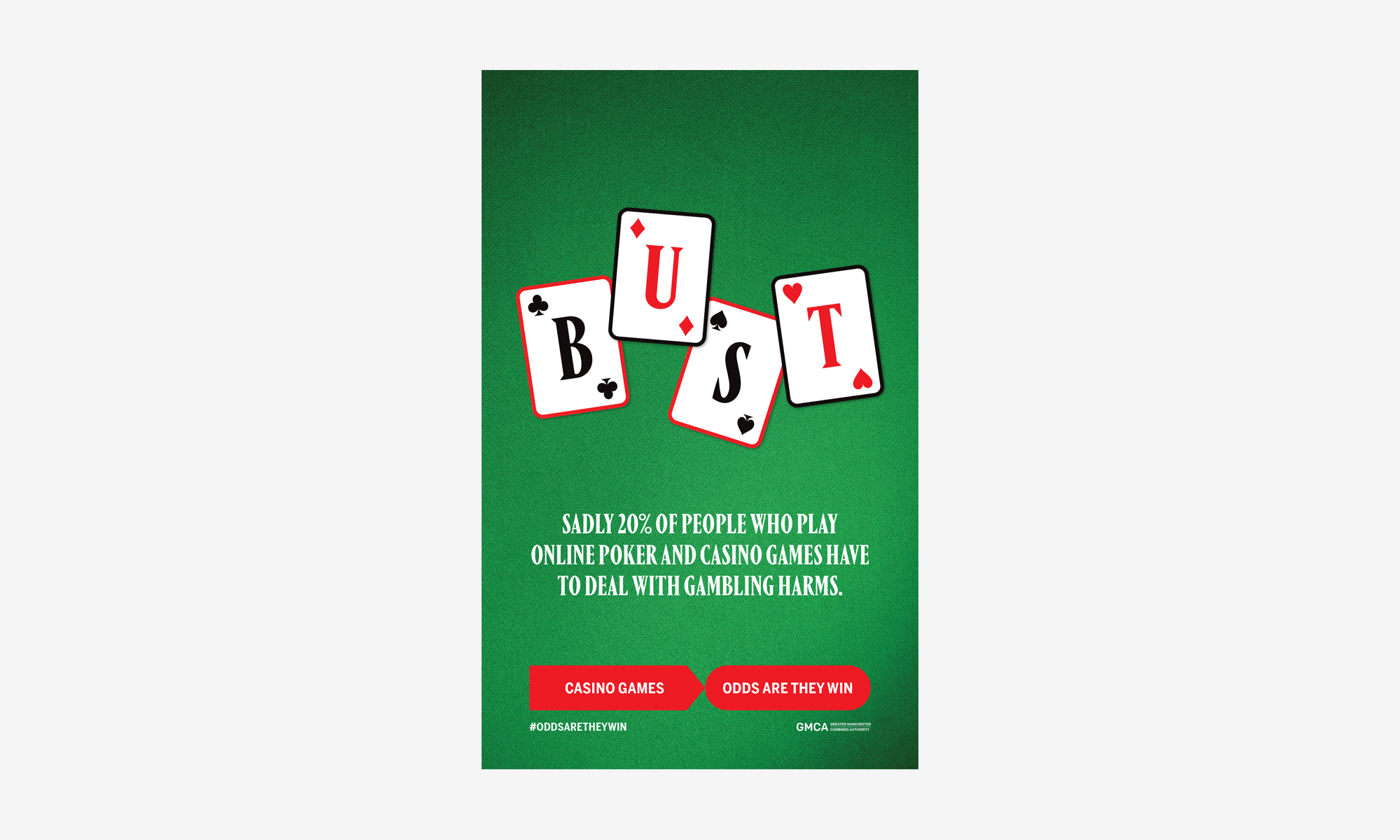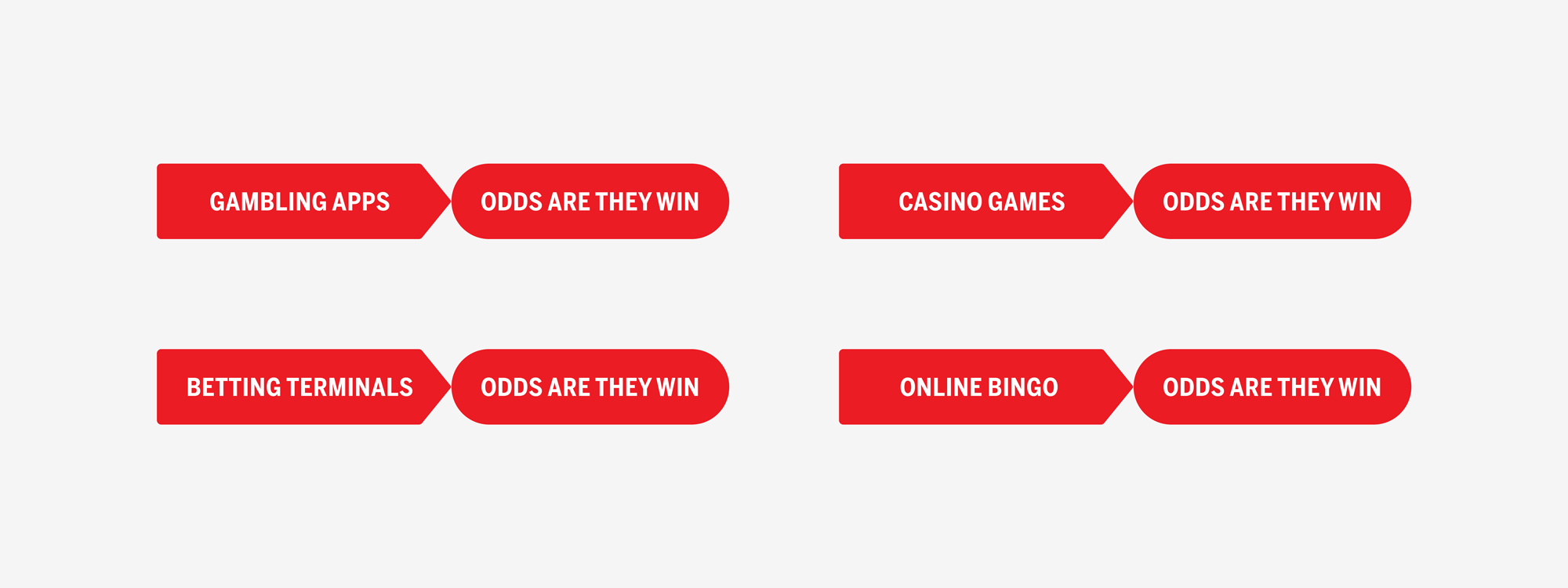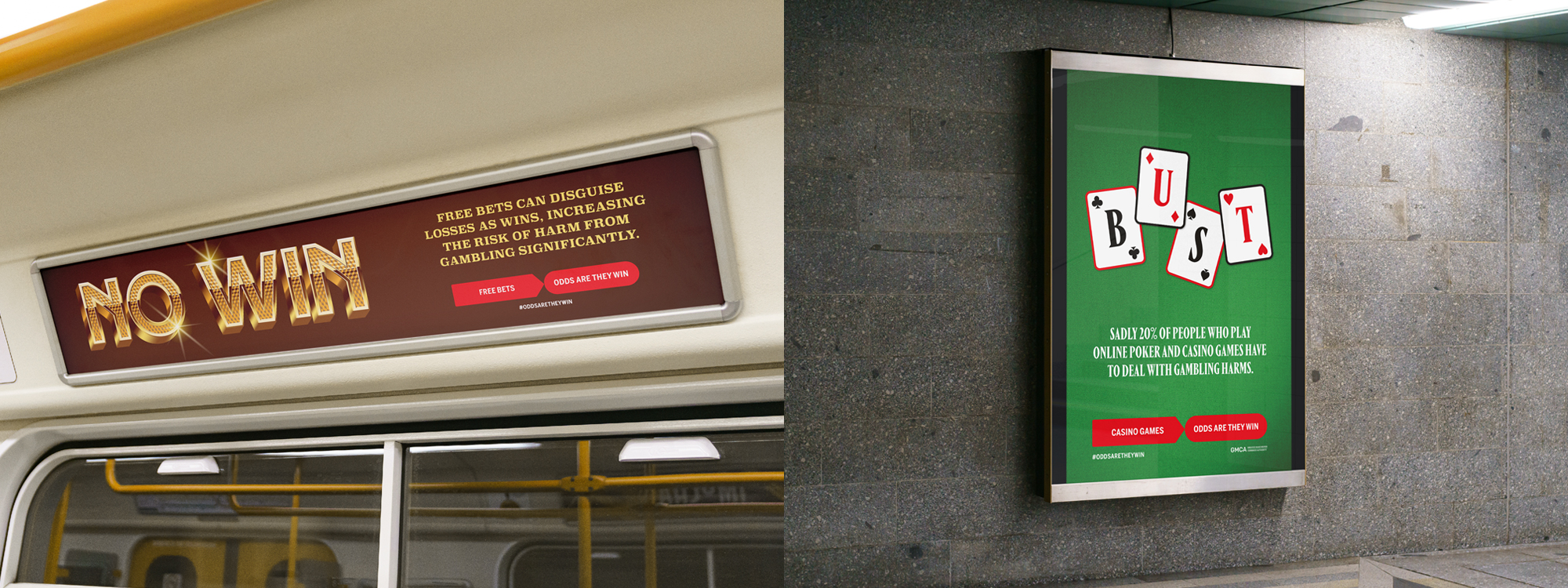GMCA Gambling Harms
How do you expose the potential harms of gambling, helping gamblers in Greater Manchester recognise the risk, without pushing blame and guilt onto the individual?
You create a campaign that hinges on the enticing and coercive tactics of the bookmaker, bringing the age-old motto ‘the house always wins’ to life with clever creativity.


The Brief
Over the last five years revenues from online gambling have increased by a staggering 62%. It’s a seismic increase, and one generated by marketing and advertising efforts that promote unrealistic wins using unlikely odds, and the unfortunate fact that gambling operators are now open for bets 24/7, 365 days of the year. The pull of a cash win is magnetic, but peel back the hyped-up promises of ‘doubled-odds’ and ‘stake-back guarantees’ and you reveal a much less enticing side to the gambling industry.
In Greater Manchester, 18,000 adults experience a gambling addiction – a rate which is 1.5x higher than the national average. And on top of that, 97,400 adults in the area are at low or moderate risk of experiencing gambling-related harms.
Yet shockingly, campaigns to prevent those numbers from growing are more often focused on highlighting what the individual should be doing to avoid succumbing to gambling industry tactics, rather than exposing their offers as being potentially harmful to low-level gamblers and a trigger for escalating and harmful gambling habits.




Changing the Narrative and Raising Awareness
The Greater Manchester Combined Authority (GMCA) recognised that the narrative needed to change. They wanted to launch a campaign that was centred on the ‘average gambler’ and remove any blame or ownership of gambling harms away from the individual. Instead – for the first time in the UK, this campaign would raise awareness of the industry and its tactics that entice, engage and potentially encourage spiralling gambling habits.
With the Football World Cup on the horizon, combined with a nationwide cost of living crisis and an impending freezing winter – there was a crucial moment for penetrating public consciousness with the reality of gambling, even for those ‘recreational’ gamblers, who aren’t aware they’re at risk of increased harm. Knowing that the campaign needed to influence how people behave during a period of bookie bombardment, GMCA identified two key audiences: young men who regularly bet on sports and young families (men and women) who might seek out gambling offers as a way of solving their cost-of-living concerns.
The campaign would seek to provide prompts to these audiences to reflect on when their habits could become harmful. Yet crucially, this needed to be done – not in a way that scolded the individual or directed them to help services, but in a way that cleverly exposed the enticing language and tactics of the bookie, creating moments for them to reflect and an opportunity to educate. This would be about revealing the true colours of the bookmaker, in a way that brought the age-old saying ‘the house always wins’ to life.
Our Response
From the outset, GMCA stipulated that the campaign needed to highlight that gambling is not binary. It is not safe/unsafe, responsible/irresponsible, healthy/unhealthy – it is fluid. Our initial desk research revealed how severe gambling-related harms are often the focus of gambling prevention campaigns, contributing to gambling being presented as only harmful when it ‘escalates’ and someone hits ‘rock bottom.’ When gambling becomes a ‘problem.’ But what if it’s not a problem, yet, or it’s a problem and you don’t know it.
We knew from the brief that this campaign would avoid that narrative entirely and focus on people at risk of experiencing low-level harm. The aim would be to change ways of thinking so that people who gamble regularly at low levels do not increase their gambling frequency, do not move to other gambling products, and people who don’t gamble, do not start gambling.
Pivoting away from the kind of content identified in our research, we developed two concepts for the campaign. The first hinged on the characterisation of the bookie, now named Jack Pot, and what gambling operators would say if they told the truth. By creating an almost spoof of other gambling ads, we would be able to inject humour into the campaign, with a clear objective of engaging those who might otherwise not seek support or interact with a gambling support campaign. Messages spoke in Jack Pot’s language and referred to the invasive and perpetual nature of online gambling adverts.
The second concept would focus more heavily on bold and impactful statements that are linked directly to exposing the tactics of the gambling industry. The proposed campaign tagline would be ‘Their game. Their gain’ – leaning into the empty promising of gambling ads, with creative messaging that read ‘bookies have a way of disguising your losses as wins.’ With both routes, we were careful to avoid any of the messaging or creative concepts feeling as though they were offering support for gambling addiction. They were about education, designed to stimulate thought around gambling industry tactics, gambling behaviours and the harm that could result from this.




Focus Groups with GamHive
The next phase of the campaign would be to put our two concepts to a focus group containing participants from a lived experience cohort, members of GaMHive. Made up of people who have either directly suffered from a gambling disorder or who have experienced harm because of someone else’s gambling, GamHive is regularly consulted on GMCA’s gambling harms work.
Having feedback from GaMHive members was essential in understanding the sensitivities to the campaign. While the messaging wouldn’t be focused on those with gambling addiction, people from this group would be unavoidably exposed to the campaign. Plus, having insight into the earlier part of the gambling journey, and the different triggers that could contribute to addiction would be invaluable in guiding our execution. Alongside this lived experience focus group, we also surveyed over 100 people from the focus audiences.
The focus groups and survey responses favoured the second concept where the focus was on bold headlines that exposed industry tactics and sought to educate on the truth, rather than any risk of making light of those who have suffered great harms from gambling. We also gained valuable insight into the campaign creative, the tone, and the payoff line – as well as specific feedback on the messages and creative elements that did and didn’t resonate with the audience. It was felt here that we could lean even further into stats and insights exposing the realities of gambling harm and the industry tactics that are to blame for this.
At the centre of these discussions was the simple fact that you can’t really ever win. However, it was also highlighted that even though people often know they won’t win big, they are often still tempted to play. So, we flipped the campaign pay-off line, highlighting instead that the bookie always wins. ‘Odds Are: They Win’ read the final version, firmly rooted in the anti-industry narrative that whatever the type of gambling and whomever the gambler is, the odds are the gambling industry always wins.


The Visual Identity
Next, we fine tuned the creative of the campaign. This involved selecting eight final messages that could be used on outdoor creative and be built out as animations for paid social/digital advertising. Each of the various touch points that would be involved in the campaign needed to bring the message to life, disrupt the narrative that puts ownership on the individual and raise awareness of the industry’s disregard for triggering more damaging gambling habits.
To ensure that the campaign was addressing the two target audiences identified in the brief, the assets covered a range of gambling types: bingo, slot machines, sports betting, and casino games. The visual identity of the campaign ads was akin to the style you’d expect to see from the gambling industry themselves, set against the top stats we could validate, relating to people suffering harm from gambling in Greater Manchester, and information that highlighted the persistent nature of gambling industry tactics.


Digital and Out Of Home (OOH)
To have maximum impact, the campaign was delivered via both offline and digital channels. The OOH campaign was live across key Transport For Greater Manchester sites, including all Metrolink coving sites, several GM Bus interchanges and digital screens. Deployed ahead of and then during the World Cup, we were confident that the high level of exposure would resonate at just the right time to influence behaviour and counteract the incoming infiltration of gambling industry promos. We also ran a poster campaign that covered 80 poster sites in Greater Manchester coffee shops, Starbucks and Costa, extending the life of the campaign beyond the World Cup and into the Christmas period when we knew the cost-of-living crisis could potentially mean part of our audience turning to further casual bets, to counteract an unrealistically expensive period.
For the campaign’s digital marketing activity, we ran a series of animated Facebook and Instagram ads that specifically targeted the two core audiences. Live for 12 weeks pre and during the Football World Cup, and then again after Christmas once the Football Premier League was underway, we ran test digital campaigns initially to see how the creatives resonated and then narrowed down to the top performing creatives. In turn, we continued to monitor objectives to ensure that we were maximising the volume of traffic to the landing page (on the GMCA website) and for engagement in-platform too, and to enhance the campaign’s relevance to the World Cup we also ran additional reactive ads that specifically quoted the number of gambling ads people would likely be exposed to during matches, helping them to consider the impact and harm that watching could have on them and their children, as well as bolstering this organically via the campaign Twitter account.
We also delivered a toolkit of assets for the third sector and council partners of GMCA to use across their digital channels. This included an organic social calendar of additional static, stat-based creatives and captions that could be scheduled and shared over the course of the campaign, which we amplified via the Twitter account. We also developed newsletter content and copy, both to announce the launch of the campaign and to further prompt the GMCA’s partners to share gambling support links during the campaign.




The Outcome
The cohesive launch and delivery of the campaign meant it was engaged with, shared and applauded by key stakeholders both in Greater Manchester and even as far as Sussex and Glasgow – and was covered by several regional local papers, including Manchester Evening News and The Bolton news, receiving support from Greater Manchester Mayor Andy Burnham and Sarah Gardner, the Deputy Chief Executive of the Gambling Commission.
Organic tweets from the campaign Twitter account gained 13.1K impressions and 74 retweets during the campaign lifespan, with over 140 mentions of the campaign hashtag #OddsAreTheyWin on Twitter during this period. And despite the purpose not being to direct people specifically to gambling help and support pages or to target those experiencing severe harm – whilst the campaign was live, in December 2022, the campaign landing page was the third most visited page across the whole GMCA website.
Access to GMCA treatment and support web pages saw a more than 500% increase in views year on year (during the campaign ‘live’ period), with 845 users overall for the first 6 weeks of 2023, almost the same as for the whole of 2022. What’s more, the NHS saw record referrals to its Northern Gambling Service in December 2022, showing the clear impact that the campaign has made so far.

“Working with the team at Glorious was a great experience from start to finish. Understanding the subject was incredibly important for our campaign, and it was clear from the start that they took pride in taking the time to properly understand the topic.
The work was always to a very high standard, the results were beyond our expectations and they were a pleasure to work with.”
GMCA
Interested in Glorious Thinking?
If you like what we did for GMCA we could do something for you.

Mailing List
Sign up to our mailing list to receive all the latest news.
Check out our privacy policy for the full story on how we protect & manage your submitted data.
